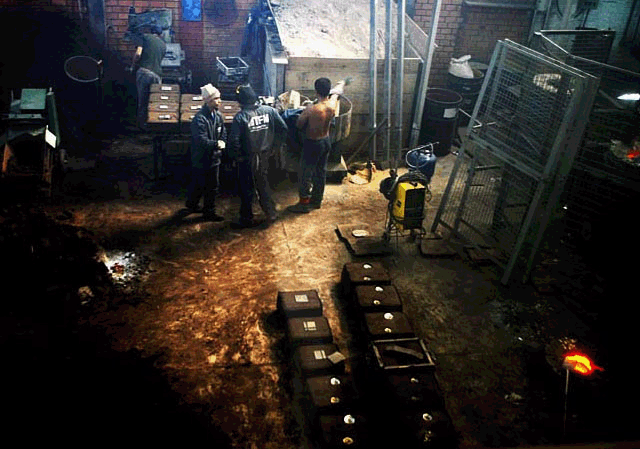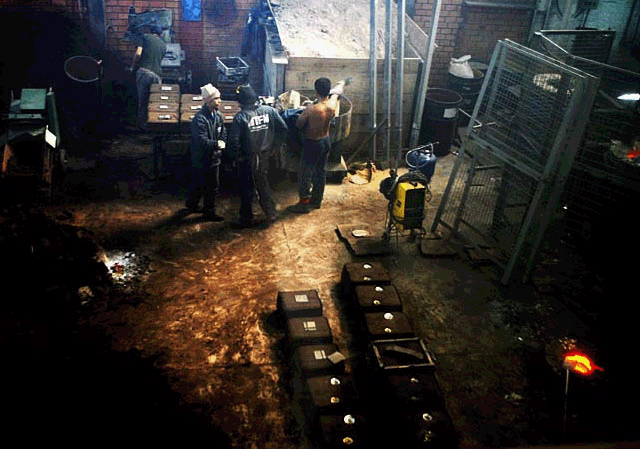Anna Rabinowicz published in Core77 on Metal Molding in the South of Brazil

Product Design faculty Anna Rabinowicz was recently published in Core77. Her contribution, Core77 Photo Gallery: Metal Molding in the South of Brazil is available via the Core77 website; the article is reprinted below:
As part of my research on bio-inspired design, I took a trip to the south of Brazil (Rio Grande do Sul), where, for nearly the past ten years, I have worked with artisans to create my designs. On this trip, I decided to investigate the metal molding industry in this region, with the hope of uncovering new manufacturing and collaborative opportunities.
During the course of this journey, I visited both sand and die casting facilities, each with their own level of technology and craft. The sand casting facilities showcased the least expensive and most primitive of the processes, in which molten metal is poured into a sand mold. Other factories focused on die casting, a process by which molten metal is poured into a machined mold (or “tool”), to produce higher-volume parts. This process affords thinner-walled parts, sharper detail, and greater precision and flexibility of materials; but also has an associated mold fee. One horizontal cold-chamber die casting facility that I visited utilizes such a precise process that the Brazilians even called it by the misnomer of “metal injection molding.” This process utilizes extremely expensive molds, but creates beautifully-detailed parts, with excellent surface finish.
During this trip, each factory emphasized the percentage of aluminum that they recycle; all claimed that they recycle between 99-100%. One reason that they are able to achieve this high recycling rate is that they use ethanol instead of using typical oil-based lubricants, when machining their parts after casting. According to Jose Augusto of Fundicao Zatti LTDA (Imeza), ethanol is used because, unlike traditional cutting fluids, it evaporates, leaving virtually no residue on the aluminum chips. When factories use traditional lubricants, and put their chips (coated in lubricant) into the furnace to be re-melted, this liquid ignites, leading to losses of about 30% to 40% of the metal. With ethanol, this loss is reduced to approximately 12%!
In fact, Brazil has one of the best global recycling rates for aluminum. According to the World Steel Association, in 2005, Brazil recycled over 96% of its aluminum cans.
Metal molding in the south of Brazil is a fast-growing industry, one which primarily appears to be supporting Brazil’s burgeoning domestic market. I believe that the challenge for foreign designers wishing to work with these manufacturers is to properly engage their interest; all seem to be operating at capacity simply to supply the domestic market. Another challenge is price — as the cost of labor and materials in Brazil is rising rapidly, the manufacturing quotes that I obtained after the trip were more than double those quoted in Asia. In order to work with Brazilian manufacturers in this region, speaking Portuguese is a major advantage, as is the willingness to travel to Brazil and to spend time in the factories. After ten years of doing business in Brazil, it is clear that building personal and long-standing relationships with the factory owners, and showing seriousness by returning year after year, are the keys to successfully working with manufacturers in this region.
About Anna Rabinowicz
Anna Rabinowicz is the founder of RabLabs, a home design company that creates objects inspired by nature which fuse ancient, precious materials with cutting-edge design. Having designed such intricate objects as prosthetic knees and devices for cardiac surgery, as well as webcams and concept car interiors for consultancies like IDEO Product Development and Design Continuum, she brings her experience and understanding of biology and nature to the design of elegant objects for the home.
Anna is also an Associate Professor in the Product Design department of Parsons The New School for Design.
